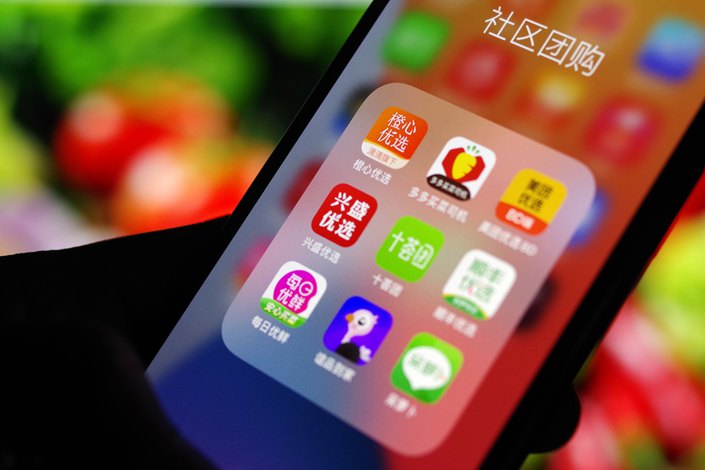Retailers See Red Over Surge in Neighborhood Group Shopping

China’s community group-buying phenomenon has gained such momentum that suppliers and brick-and-mortar retailers are fighting back by trying to restrict buyers’ access to prevent a price war.
Multiple grain, oil and grocery suppliers are moving to restrict partner wholesalers from taking orders from community group-buying (CGB) entities, groups made up of residents combining to buy fresh food at discount prices through platforms like bargain shopper Pinduoduo.
Hebei province-based food manufacturer Huahai Shunda Grain and Oil Seasoning Co. Ltd. has prohibited its wholesalers from supplying to CGB platforms without authorization, it said in an internal notice to distributors. It said offered prices should not be lower than the retail price set by the company.
The grain oil and seasoning supplier has received complaints from supermarkets which trade with the company and requests for refunds because they have been unable to compete with the CGB leaders or similar platforms, a company spokesperson said. Dealers that violate these rules will be revoked, the notice to distributors said.
Other food suppliers, like snacks wholesaler Weilong Trade Co. Ltd. and vinegar-maker Shanxi Zilin Vinegar Industry Co. Ltd., have issued similar orders, copies of which have gone viral online.
A spokesperson for Huahai Shunda told Caixin its strategy was not to restrict all supplies to community group buyers, but to maintain the current price system and protect individual retailers.
“We’d rather not partner up with CGB than have to lower our prices to join a ‘price war’,” the company said. It was worried that opting out of the CGB trend would mean losing out to competitors who would clinch more orders by offering better prices.
The move by suppliers to shackle their wholesalers comes as individual brick-and-mortar retailers like supermarkets are increasingly losing their market edge to CGB platforms, which sell at much lower prices. This also puts pressure on producers to offer competitive prices to stay in the market.
The CGB buying deals are often coordinated by community leaders who collect neighbors’ shopping orders through group chats or mini-programs on WeChat and the practice has gained strong momentum this year.
Tech conglomerates like Alibaba which operates grocery unit Freshippo, Meituan which runs Meituan Youxuan – roughly translated as first choice – and Tencent-backed startup Xingsheng Youxuan, have all dived headfirst into the sector to tap the growing demand for door- to-door grocery deliveries for people quarantined at home during the pandemic.
The group e-commerce platform Pinduoduo has doubled down on grocery CGB by launching Duo Duo Maicai in August. The Uber-like ride-hailing giant Didi Technology Co. Ltd. did a trial launch of its grocery buying app, Chengxin Youxuan, in May in Chengdu, and has made it available in 14 provinces.
The grocery retail market, which remains a holy grail of e-commerce giants which have struggled to nail the business model, is estimated to grow 8% at best from 5.2 trillion yuan ($794.4 billion) last year to over 6.7 trillion yuan in the next two years, according to the McKinsey China Consumer Report for 2021.
The online segment is expected to reach 1.2 trillion yuan by 2022, accounting for 18% of the whole grocery retail market, and widening from 10% growth last year, the report said.
Contact reporter Anniek Bao (yunxinbao@caixin.com)
Download our app to receive breaking news alerts and read the news on the go.

- PODCAST
- MOST POPULAR






